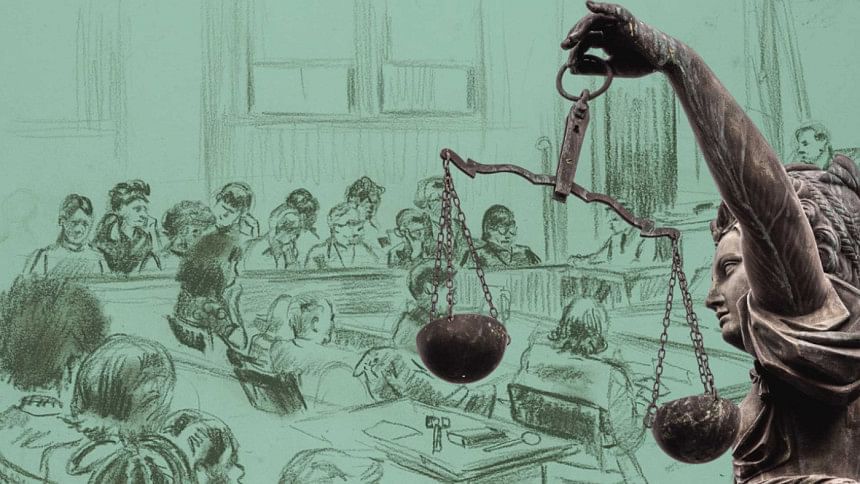Where is our independent prosecution service?

Although we frequently hear calls for justice whenever a grievous crime takes place, the role of public prosecutors, i.e. the very individuals who conduct criminal cases in court on behalf of the state, is seldom—if ever—discussed.
Three state actors play the most important roles in ensuring justice for a crime. The police record the complaint and investigate the crime. The public prosecutor presents the case in court and formulates arguments as to why the accused ought to be convicted. Finally, the judge weighs the evidence and arguments put forth by both sides, and decides whether there is sufficient evidence to punish the accused, or whether they must be acquitted. While we commonly acknowledge the important role of police and judges in ensuring justice and subject them to some critique, public prosecutors often escape public scrutiny, despite playing a role that is no less important than the other two actors.
Although members of the police force are recruited through the Bangladesh Civil Service, and judges are recruited through the Bangladesh Judicial Service Commission, no such recruitment system exists for public prosecutors. As a result, there is no officially prescribed selection criteria for public prosecutors that is based on merit and qualifications, nor is there any permanent service regulation to ensure their efficiency and accountability. Section 492 of the Code of Criminal Procedure, 1898 gives the government the power to appoint public prosecutors. Currently, public prosecutors, additional public prosecutors, special public prosecutors and assistant public prosecutors are appointed by the Solicitor Wing of the Law and Justice Division under the law ministry.
According to the Justice Audit in 2018, public prosecutors and additional public prosecutors in metro areas receive a daily fee of Tk 500, and a monthly allowance of Tk 2,000. In non-metro areas, their daily fee is Tk 250, while the monthly allowance is Tk 1,500. Assistant public prosecutors receive a daily fee of Tk 200 in both areas, but no monthly allowance. Given such meagre pay, prosecutors often engage in private practice, which hampers their state duties, or seek additional income through other means, according to a 2016 research report on criminal justice in Bangladesh by the International Crisis Group.
Experts have long called for an independent prosecutorial service in Bangladesh. In 2006, at a Regional Workshop on Strengthening the Criminal Justice System arranged by the Asian Development Bank (ADB), the then Law Minister Moudud Ahmed highlighted our disintegrated public prosecution system as one of the two key weaknesses of the criminal justice system in Bangladesh, the other being weak investigation. He said, "Bangladesh has no permanent public prosecutors. Every political government appoints its own political allies in the public prosecutorial service to serve at its pleasure and only while its term lasts … The ad hoc nature of their appointment prevents continuity in service and accountability." He mentioned that as an "initial step," the law ministry had prepared a law to introduce a permanent attorney service in Bangladesh, so that public prosecutors would be "recruited purely on merit basis after passing a national examination like that taken by other civil servants … As permanent appointees, they will be made accountable in the performance of their duties." This law was not, however, passed during his tenure.
More recently, in January 2017, the then Chief Justice Surendra Kumar Sinha had denounced the partisan bias in appointing public prosecutors at a meeting of the Supreme Court Legal Aid Committee. He said, "Earlier, in every district, the famous and renowned lawyers used to be appointed as APP in criminal cases. This post was dignified. But now they [those who are loyal to the ruling party] are being recruited instead of the experienced lawyers."
Interestingly, the last caretaker government had promulgated the Government Attorney Services Ordinance, 2008, which had set up a separate and permanent Government Attorney Services Department. The purpose of this department was to appoint, train, retain and administer government law officers to ensure effective representation of the state in the judicial process in the Supreme Court, district courts and upazila courts. However, as ordinances are laws that are made in the absence of parliament, Article 93 of the constitution requires them to receive parliamentary approval at the first parliamentary session after any ordinance is promulgated. In absence of such approval, it will cease to have effect, as was the fate of the Government Attorney Services Ordinance.
Notably, Section 1.4.3 of the Eighth Five Year Plan (2020-2025) published by the Bangladesh Planning Commission specifically states establishment of an independent prosecution service as one of the key targets in relation to improvement in governance and institutions. It mentions that "primarily 70 percent of this attorney service appointment will be from registered advocates which will be selected by government. Rest 30 percent will be recommended by Judicial Service Commission to appoint. Before, adhering to the appointing process, it will develop attorney service appointing rule, disciplinary rule, service rule, posting and promotion guidelines, in service training procedures, etc."
Although the Eighth Five Year Plan states that the "government will gradually execute this decision," whether an independent prosecutorial service will in fact be established in the coming years remains to be seen. A useful starting point for the government in introducing this long overdue service would be to consult the Guidelines on the Role of Prosecutors adopted by the Eighth United Nations Congress on the Prevention of Crime and the Treatment of Offenders in 1990. Under Article 2 of the guidelines, member states must ensure that the "selection criteria for prosecutors embody safeguards against appointments based on partiality or prejudice," and excludes any discrimination against a person on any grounds, such as political status. Article 4 of the guidelines requires the states to ensure that prosecutors are able to perform their professional functions without improper interference.
As we celebrate 51 years of independence, how much longer must we wait to see the introduction of an independent prosecution service that can truly combat crime?
Taqbir Huda is the advocacy lead for the Gender Justice and Diversity Programme at Brac.

 For all latest news, follow The Daily Star's Google News channel.
For all latest news, follow The Daily Star's Google News channel. 



Comments